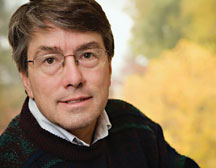DeVoogd: Offer 'science diplomacy' with developing nations

Greater interaction among scientists from developing nations and U.S. scientists "could be transformational" because science "can provide answers to health and environmental problems and stimulate national development," says Cornell psychology and neurobiology professor Timothy DeVoogd in an editorial titled "Science to Bridge the Americas" published in the Feb. 26 issue of Science.
DeVoogd was a Jefferson Fellow last year at the U.S. State Department. The Jefferson Science Fellows program was launched in 2003 to engage science, technology and engineering academic communities in U.S. foreign policy and to help bridge gaps in learning and technology between developed and developing countries. Cornell contributes to this program by continuing salary and benefits for any faculty members who may be selected for the fellowship. DeVoogd worked in the Western Hemisphere Bureau and "traveled to universities, research institutes and government agencies, seeking to enhance connections with foreign scientists. From [his] discussions with scientists and administrators across 12 countries in Latin America, several ideas repeatedly emerged for meeting the challenges ahead in health and environmental arenas, among others."
"With minimal additional resources, the United States could bolster international collaborations," DeVoogd writes. He suggests among other things that the U.S. Fulbright program could make training in the sciences a larger proportion of its mandate and that "A dedicated program that supports visits of foreign scientists to a U.S. lab for as little as one to two months could also have a huge impact on science in Latin America."
He concludes, "The potential for scientific and societal payoffs is immense, as a better-linked scientific community will speed progress in responding to major problems that affect us all: health, energy, climate change and preserving biodiversity. And even more importantly, programs that support international science broadly will position humanity to understand and meet the challenges yet to come."
Media Contact
Get Cornell news delivered right to your inbox.
Subscribe